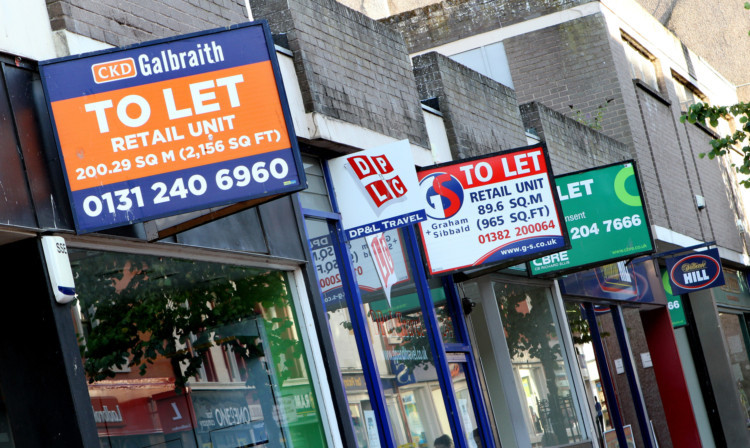The largest town in Angus is “vulnerable” according to a think tank report published.
A preponderance of charity and discount shops, frayed and ageing buildings, and a lack of night activities have conspired to reduce Arbroath’s small town status, say the Built Environment Forum Scotland (BEFS).
Chairman Cliff Hague also said nearby towns in Angus are under threat, as Brechin and Kirriemuir also underperformed in a town “health check”.
Mr Hague and his researchers launched the report in Helensburgh with a “check list” on the way forward for small towns in Scotland.
They have called for a national small town policy to save an important part of Scotland’s makeup.
In one of six case studies, Mr Hague mentions Arbroath has a “strong legacy from the 18th and 19th Century” and an imaginative marina with a “strong sense of place” along the waterfront.
However, his report states Arbroath is “now vulnerable to forces outside its own control” in terms of industry and local representation.
He states: Economic restructuring resulted in loss of traditional sources of employment in mills and engineering and in the fishing industry.
“While it is the largest town in Angus, it no longer has its own town council. For both local government and VisitScotland, it is just one part of a wider administrative unit.”
Changes to soft fruit production and a migrating workforce have had “knock-on impacts into housing and social life in the town.”
The “struggling” town centre comes under the microscope most often with no public square, and a shopping centre with large numbers of vacancies in the Abbeygate “probably reflecting over-ambitious estimations of the rents they can command under current conditions.”
Much of the 19th Century High Street has vacant upper levels and some independent retails but “few use the name Arbroath in promoting their services.”
He adds: “The main impression of the retailing is that there is a high proportion of ‘bargain’ or ‘pound shops’.
“Meanwhile, there is some evidence that repair and maintenance of frontages and roofs is falling behind. The overall picture appears to be that there is not much to do in town in the evening.”
There are positive aspects the town can build on, however, according the BEFS.
Mr Hague said: “Compared to the rest of Angus, Arbroath remains a place where there are good jobs.”
He refers to the industrial edge of town, the successful Sea Fest and its related industries, Mackay Boat Builders as the only operating yard of its kind between Eyemouth and Peterhead, and the longevity of the Webster Memorial Theatre.
It is likely new types of uses and business models for High Street stores will be necessary, specialising in personal services.
Mr Hague holds up Darling’s Coffee Shop on the High Street, a social enterprise run by Enable Scotland, as a good example of succeeding in a different way.
There is, however, little scope for retaining young people in terms of higher education, or in drawing them back after graduation.
“The lack of higher education opportunities in the town means there is a haemorrhaging of young people who leave to go to university,” Mr Hague adds.
The lack of a website for the town is “a serious weakness” along with the lack of marketing to the Scottish diaspora, other than through the general benefits that accrue through Tartan Day, which is held in annually in the USA to coincide with the anniversary of the 1320 Declaration.
A window of opportunity in 2020 for the town’s 700th anniversary “needs to be planned for.”
A spokesman said: “BEFS has identified small towns as a critical but too often neglected component of Scotland’s built environment.
“BEFS labelled the visits a ‘small towns health check’ and devised a ‘folk-work-place’ checklist approach to share ideas and focus discussion.”
The report’s key recommendations include:
* More research is needed on the economic significance of Scotland’s small towns to underpin a small towns policy sitting alongside urban and rural policy.
* The conservation area regeneration scheme and the town centre regeneration programme have helped to provide investment to conserve and enhance the centres of small towns. Such investment will continue to be needed, but the CARS should include powers for compulsory purchase.
* Means should be explored to enable temporary use by not-for-profit organisations of commercial premises that have been vacant for six months.
Mr Hague and his colleague Gemma Learmonth met councillors, the planning team and town centre regeneration group. The addition of a good-quality hotel was mentioned as a catalyst for growth during Mr Hague’s visit.
He added: “Local engineering firms tell us they are using accommodation outside of Arbroath and a big conglomerate could help bring people back.”
